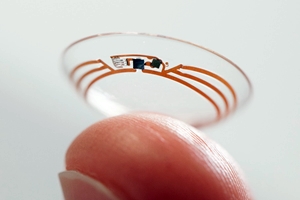15 July 2014. The Alcon division of pharmaceutical company Novartis is licensing the rights to Google’s so-called smart lens technology for medical applications involving the eyes. Financial terms of the licensing agreement between Alcon that develops vision care products for Novartis and Google[x], part of the company’s research labs, were not disclosed.
Google[x] announced in January 2014 its smart contact lens project to embed sensors in contact lens that can analyze the composition of tears to gauge blood glucose levels for people with diabetes. The prototype layered a miniaturized glucose sensor and wireless transmitter between two soft contact lenses that measures blood glucose levels up to once a second.
The technology was developed in Google by Brian Otis and Babak Parviz, two research scientists who previously collaborated at University of Washington, and were originally recruited to work on Google Glass. The company said at the time it completed clinical studies of the device and talked with the Food and Drug Administration, but was still seeking partners to take the technology to market.
Novartis says it aims to combine Alcon’s expertise in medical issues involving the eyes with Google’s experience in low-power and miniaturized electronics. Alcon already offers contact lenses, prescription medicines for eye disorders, over-the-counter eye care items, and intraocular surgical products, such as those used in cataract procedures.
The company plans to further develop the smart lens application for people with diabetes, to assess glucose levels in tear fluid and transmit the data to a wireless device. Novartis also is interested in developing a contact or intraocular lens that can restore the eyes’ ability to focus on objects up close for individuals with presbyopia, a condition that makes focusing on near objects difficult for people as they age.
Read more:
- Trial: Insulin Pumps Better Control Glucose Than Injections
- Challenge Seeks Development Partner for Nanotech Biosensor
- Project Underway to Enable Mobile Health Data Collection
- Wireless Power System Invented for Miniaturized Implants
- Remote Device Monitoring Linked to Higher Survival Rates
* * *


 RSS - Posts
RSS - Posts
You must be logged in to post a comment.